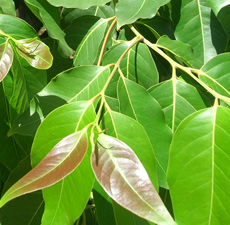Botanical Name: Eucalyptus globulus
Common Method Of Extraction: Steam distilled
Parts Used: Leaves and twigs
Note Classification: Top
Aroma: Fresh, penetrating, woody, camphoraceous
Largest Producing Countries: Australia, Brazil, and Spain
Traditional Use: Eucalyptus is one of the oldest native medicines used in Australia. It is known now for its use in inhalants and vapor rubs, and as a household disinfectant and cleaner.
Properties: Analgesic, antibacterial, antifungal, antineuralgic, antirheumatic, antiseptic, antispasmodic, antiviral, decongestant, deodorant, depurative, diuretic, expectorant, febrifuge, stimulant, vermifuge, vulnerary
Benefits: Asthma, blisters, bronchitis, bruises, burns, candida, catarrh, chills, colds, cough, cystitis, fever, headache, influenza, insect bites, lack of concentration, measles, mental exhaustion, muscular aches and pains, neuralgia, respiratory infection, rheumatism, sinusitis, skin infections, skin ulcers, slow circulation, sore throats, sprains, throat infections, viral infections, wounds. Eucalyptus is often added to inhalations, oils, and ointments for respiratory infections and congestion. The properties that help with these ailments include antispasmodic, expectorant, decongestant, and antiviral. The antiviral and antibacterial actions of this oil can be taken advantage of by adding it to a disinfectant blend for a diffuser to cleanse the air.
Of Interest: The word eucalyptus is derived from Greek meaning "well covered". This refers to part of the calyx that initially covers the flower.
Common Method Of Extraction: Steam distilled
Parts Used: Leaves and twigs
Note Classification: Top
Aroma: Fresh, penetrating, woody, camphoraceous
Largest Producing Countries: Australia, Brazil, and Spain
Traditional Use: Eucalyptus is one of the oldest native medicines used in Australia. It is known now for its use in inhalants and vapor rubs, and as a household disinfectant and cleaner.
Properties: Analgesic, antibacterial, antifungal, antineuralgic, antirheumatic, antiseptic, antispasmodic, antiviral, decongestant, deodorant, depurative, diuretic, expectorant, febrifuge, stimulant, vermifuge, vulnerary
Benefits: Asthma, blisters, bronchitis, bruises, burns, candida, catarrh, chills, colds, cough, cystitis, fever, headache, influenza, insect bites, lack of concentration, measles, mental exhaustion, muscular aches and pains, neuralgia, respiratory infection, rheumatism, sinusitis, skin infections, skin ulcers, slow circulation, sore throats, sprains, throat infections, viral infections, wounds. Eucalyptus is often added to inhalations, oils, and ointments for respiratory infections and congestion. The properties that help with these ailments include antispasmodic, expectorant, decongestant, and antiviral. The antiviral and antibacterial actions of this oil can be taken advantage of by adding it to a disinfectant blend for a diffuser to cleanse the air.
Of Interest: The word eucalyptus is derived from Greek meaning "well covered". This refers to part of the calyx that initially covers the flower.
